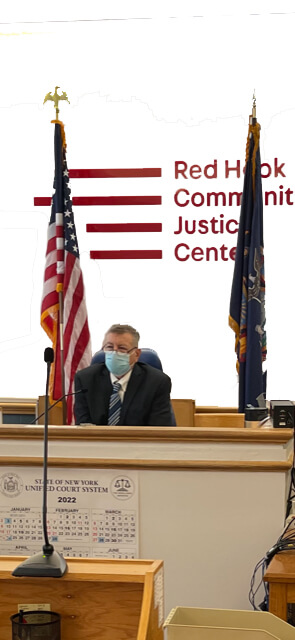Red Hook’s Community Justice Center has been an important part of the neighborhood since opening on Visitation Place in 2000. I had the opportunity to get a tour of the Center and speak to Judge Alex Calabrese, attorney Edna McGoldrick, and Director of Housing and Civil Justice, Ross Joy.
I got to witness some of the housing court cases that took place at the Justice Center, including one involving a woman from the Red Hook Houses, who has had a broken shower for more than six months. Another case involved a woman whose stove that has not worked for more than three months.
“I want to make sure that everyone knows they should come to us if they’re having a problem like this,” Calabrese said. “I know a lot of people worry about coming to court but they’re entitled to the repairs. Unfortunately, it tends to be a long drawn out process but we’ll make sure the repairs get done.”
Calabrese has even visited some apartments that aren’t getting needed repairs in a timely fashion in order to try to speed up the process.
One of the biggest obstacles for the Justice Center during the last couple of years has been adjusting to virtual court and dealing with the many challenges posed by the COVID-19 pandemic.
“To call it a challenge for us, is an understatement,” McGoldrick said. “We had been doing things in person for so long and it’s a huge change and adjustment. Today, one person was holding their camera while walking and he couldn’t hear us well and the moving camera was making me dizzy. I’m a bit old-fashioned in this way but I think it makes a big difference to work with people in person.”
“It’s just not the same when you’re not talking to and working with people in person,” said Calabrese.
“We’re holding housing court again and the number of cases has increased and unfortunately there are a lot of apartments that are in bad shape and desperately need work done. The other cases that we had very frequently before the rent moratorium were tenants not being able to pay the rent.
“One of the things we try to do here is get to the root of why people are ending up here, whether it’s for getting behind on the rent, or shoplifting or assault. Rather than just having them serve their time and end up back here again later on, we try to help people long-term. If they have a drug issue, we try to work with them to get sober, if they’re having mental health issues we want to get them the treatment they need.”
McGoldrick also told me about peacemaking, which is a holistic approach, based on Native American tradition, that allows everyone involved in a situation to talk through the problem and work together to reach an agreement on restitution and repair. It’s different than a typical mediation process where an impartial person listens to each party’s side of the story and then makes a final decision.
“For example, there was a young man who hit and injured his sister because she took his food,” McGoldrick said. “There were obviously deeper issues than her taking his food so we brought both of them in and we brought in the parents and we got them to talk about what was really going on. They got to the heart of the problem instead of just coming up with a temporary solution that wouldn’t resolve those deeper issues.”
I was invited to observe the courtroom, which struck me in that the judge’s seat wasn’t up above everyone else’s like I was used to seeing on television or at Borough Hall.
“That was done to make the process less intimidating,” McGoldrick said. “There are also windows without locks so there can be some light in the courtroom. We don’t want people to feel afraid when they come here.”
I felt comfortable, which seemed fitting for Red Hook. I also got to see the cells, and while they weren’t fancy they certainly seemed nicer than the pictures of the cells at Rikers Island, and the bathrooms at least provided some privacy. McGoldrick’s one complaint about the facility is that it does not provide much privacy for visitors or lawyers to speak to people being held in the cells, which makes it difficult to discuss their cases.
“We want people to be comfortable when they come here and to know that they will be treated with respect,” Calabrese said.
Calabrese, McGoldrick, and Joy spoke about the importance of treating those in the Center with dignity and respect. This came through in their interactions with people and throughout my tour.
“We do a lot of prevention services, not waiting for people to have a housing case or facing eviction,” Joy said. “One of the services we’ve expanded, especially during the pandemic, is helping people with the lease renewal process. There’s a lot that goes into it and it’s actually a burdensome process so that’s our bread and butter. We’ll do around 15 certifications in a day when it’s busy.”
Another form of assistance the Center provides is helping tenants (especially the elderly) learn how to use technology to renew leases.
While Wednesday is the day when housing court proceedings are actually scheduled in the courtroom, the help desk is open Monday-Friday to answer housing-related questions.”
It was a busy day at the Justice Center with Calabrese, McGoldrick, and Joy having to move from room to room and work with a lot of different people.
“We’re here in person, and there’s a lot to get done,” McGoldrick said. “We had to get used to virtual court and now we’re getting back to live. I’d just like people to know that we’re here to continue to help people and try to make a difference for the community.”









